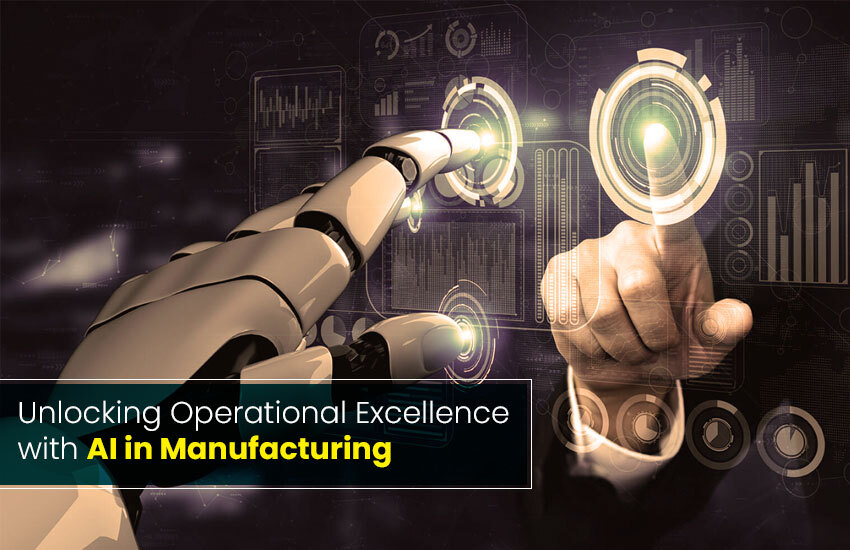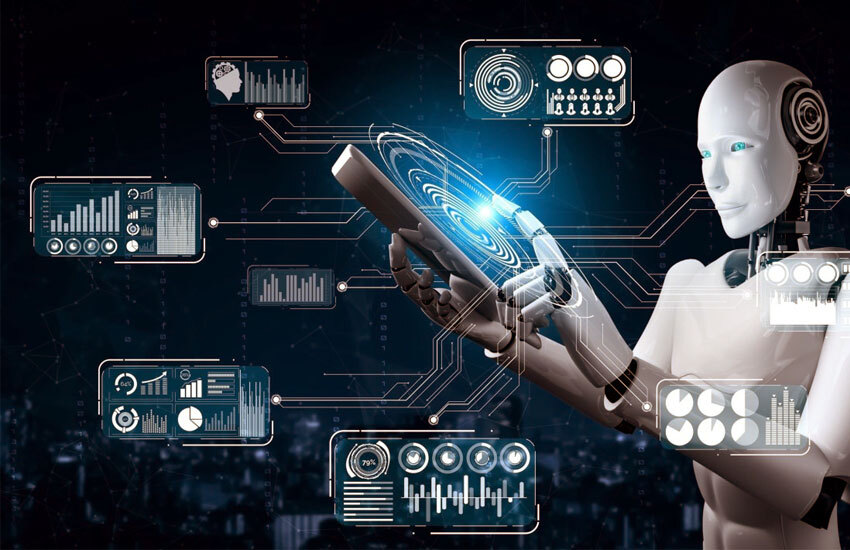
Technological advancements are continuing to revolutionize the manner in which businesses operate, and the manufacturing industry has reached a critical juncture in its evolution. The integration of artificial intelligence (AI) into manufacturing processes is at the forefront of this transformation. AI in manufacturing is transforming the industry by enhancing operational efficiency, reducing costs, and enabling manufacturers to achieve new levels of productivity. Organizations can optimize their supply chains, production lines, and predictive maintenance by adopting AI-powered manufacturing solutions.
This blog will investigate the ways in which smart manufacturing with AI is transforming the future of production and enabling operational excellence. It will emphasize the impact of AI-based automation, predictive maintenance, and smart manufacturing, among other critical areas.
Artificial Intelligence in manufacturing is a comprehensive approach to enhancing all aspects of production, from resource allocation to quality control, going beyond mere automation. Artificial intelligence for manufacturing enables organizations to make more informed, data-driven decisions, resulting in enhanced product quality, increased efficiency, and reduced waste.
To get a clear understanding about Artificial Intelligence in manufacturing, read our comprehensive blog, “AI in Manufacturing: Shaping the Future of Smarter Factories”!
AI's fundamental function is to improve the decision-making process and provide predictive capabilities. Manufacturers can anticipate prospective issues and modify processes in real time by employing predictive analytics and data analysis. This proactive approach is essential for the attainment of operational excellence, as it optimizes workflow efficiency and reduces disruptions.
AI manufacturing solutions comprise a diverse array of technologies and tools that are intended to enhance manufacturing processes. These innovations enable businesses to optimize resources, streamline workflows, and automate tasks, ranging from AI-driven manufacturing solutions to AI manufacturing technologies.
AI-based automation in manufacturing is a notable area in which smart manufacturing with AI is having an impact. Manufacturers can enhance consistency, reduce human intervention, and achieve higher throughput by incorporating AI-driven robots and automation tools. AI manufacturing automation not only enhances efficiency but also reduces the likelihood of errors, resulting in more consistent and precise production outcomes.
Furthermore, AI-powered manufacturing solutions can assist in the optimization of labor-intensive processes, including assembly, inspection, and packaging. The potential for innovation in smart manufacturing with AI is increasing exponentially as AI technology for manufacturing processes continues to advance, enabling the development of more adaptive and agile production environments.
The capacity of AI for predictive maintenance in manufacturing to anticipate equipment failure prior to its occurrence is a substantial advantage. Traditional maintenance practices frequently involve either reactive maintenance or scheduled downtime, both of which can result in unnecessary costs and decreased productivity. AI-driven predictive maintenance employs machine learning algorithms and sensor data to predict the likelihood of machine failure, thereby adopting a more proactive approach.
Manufacturers can prevent unanticipated delay and costly repairs by anticipating potential issues in advance. This not only contributes to the overall AI in manufacturing operations management but also maximizes the lifespan of apparatus, thereby reducing operational costs. Predictive maintenance also enhances quality control automation, guaranteeing that production proceeds without any unexpected interruptions.
One of the most critical applications of AI in the manufacturing industry is the integration of predictive maintenance tools. Manufacturers can enhance equipment reliability and ensure optimal operational performance by leveraging AI's capacity to anticipate equipment failures and identify performance anomalies.
Traditional factories are being transformed into intelligent, data-driven environments by smart manufacturing solutions that are propelled by AI. Manufacturers can establish self-optimizing production lines that adjust to evolving conditions in real time by integrating AI technologies with production systems. AI-enhanced systems have the capacity to monitor production, identify bottlenecks, and autonomously adjust parameters to enhance resource utilization and throughput.
AI-driven manufacturing processes allow manufacturers to optimize operations in ways that were previously unattainable. For instance, AI in production optimization enables dynamic scheduling, which involves the automatic adjustment of production lines in accordance with supply and demand. This directly impacts the bottom line and drives ROI through higher performance metrics, minimizing waste and ensuring the efficient use of resources.
Supply chain optimization with AI is an additional critical component of smart manufacturing with AI. Real-time tracking of products, predictive forecasting, and more intelligent inventory management are all facilitated by AI applications in manufacturing. Businesses can mitigate the risk of stockouts and overstocking by optimizing demand forecasts and automating order management. This approach also leads to increased customer satisfaction and cost savings.
AI-based automation in manufacturing is essential for companies that wish to optimize their operations and accomplish continuous production enhancements. AI manufacturing automation not only automates repetitive tasks but also incorporates intelligence into operations, allowing systems to make autonomous decisions.
AI-powered manufacturing is exemplified by the implementation of robotic process automation (RPA) on assembly lines. RPA robots are capable of performing duties such as picking, placing, and packaging with superior precision and speed. Furthermore, these machines can function in conjunction with human operators, thereby establishing a collaborative and efficient workforce. Manufacturers can guarantee faster production cycles, reduce costs, and improve product consistency by utilizing AI manufacturing automation.
The real-time monitoring of quality is also facilitated by AI technologies in manufacturing processes. AI systems can identify defects that would otherwise go undetected by inspecting products during every stage of production with quality control automation. This results in improved brand reputation, fewer returns, and higher-quality products.

AI in manufacturing operations management is essential for the optimization of resources and the formulation of decisions. AI can offer actionable insights to assist manufacturers in more effectively managing resources by processing vast quantities of data and analyzing trends. AI has the capacity to identify inefficiencies in the supply chain, optimize production scheduling, and even suggest modifications to enhance labor utilization.
Additionally, artificial intelligence (AI) can assist in sales enablement by offering manufacturers predictive lead scoring, which enables them to optimize their sales processes and forecast demand. This, in turn, enhances the accuracy of sales forecasting, minimizes stockouts, and guarantees that consumers have access to the appropriate products at the appropriate time.
AI technology for manufacturing processes is becoming a cornerstone of innovation as the manufacturing sector undergoes a digital transformation. Artificial intelligence in manufacturing allows businesses to capitalize on data to improve efficiency, enhance decision-making, and establish a competitive advantage in the market.
Additionally, the proliferation of generative AI presents additional prospects for product design and prototyping. Manufacturers can expedite the process of developing optimized product prototypes, thereby decreasing development costs and time-to-market, by utilizing AI-based design tools. This enhances the overall customer experience and satisfaction by enabling a more rapid response to customer demands.
The future of AI in the manufacturing industry is optimistic. Manufacturers will have access to even more potent tools for automation, optimization, and decision-making as AI technologies continue to develop. The integration of augmented reality and multimodal AI will enhance the efficiency and collaboration of production environments, thereby creating additional opportunities for AI-driven innovations.
As the AI manufacturing industry expands, it will continue to influence the future of production. AI is enabling manufacturers to achieve new levels of productivity and operational excellence by enhancing operational efficiency and establishing intelligent supply chains.
AI in manufacturing is not merely a trend; it is the industry's future. Companies can enhance their production processes, reduce costs, and achieve greater efficiency by implementing AI-powered manufacturing solutions. The potential for innovation is boundless, whether it is achieved through predictive maintenance, AI-based automation, or smart manufacturing with AI. The manufacturing industry will be significantly influenced by the ongoing evolution of AI manufacturing technologies, which will unlock operational excellence and enable businesses to flourish in a highly competitive environment for years to come.
Let’s connect: www.modelcamtechnologies.com
Email: sales@modelcamtechnologies.com
Mobile no : +91 8237016167
©Copyright 2025. All rights reserved by Modelcam Technologies Private Limited PUNE.